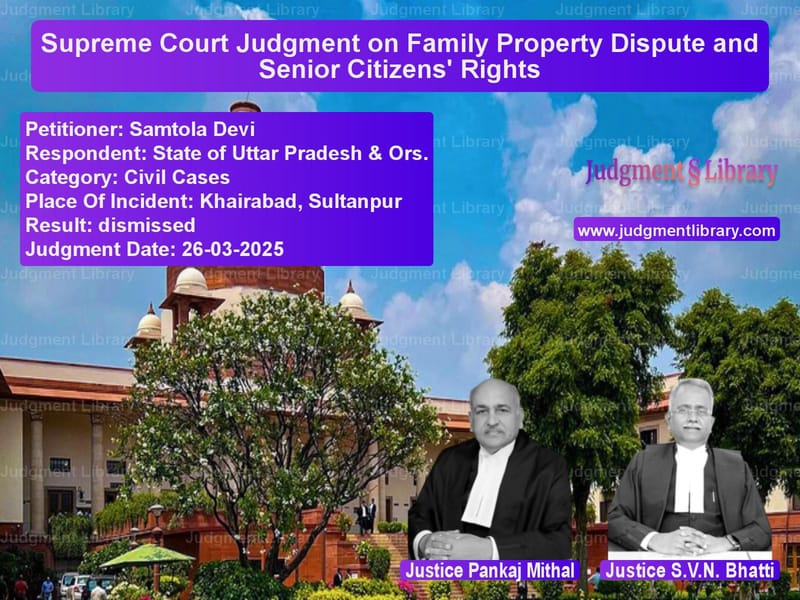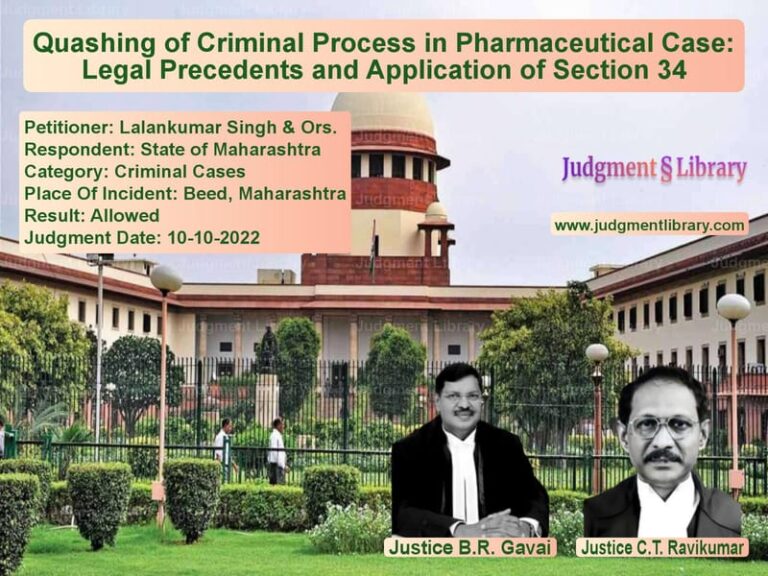Supreme Court Judgment on Family Property Dispute and Senior Citizens’ Rights
In a recent judgment, the Supreme Court of India addressed a complex family dispute involving property rights, maintenance, and the welfare of senior citizens. The case, Samtola Devi vs State of Uttar Pradesh & Ors., revolved around the eviction of a son from his parents’ property and the interpretation of the Maintenance and Welfare of Parents and Senior Citizens Act, 2007. Here’s a detailed breakdown of the case, the arguments presented, and the court’s ruling.
Background of the Case
The appellant, Samtola Devi, and her late husband Kallu Mal had three sons and two daughters. The family owned a house with three shops in Khairabad, Sultanpur. Over time, disputes arose between the parents and their sons, particularly the eldest son, Krishna Kumar. Kallu Mal alleged that Krishna Kumar physically and mentally harassed him, leading to legal proceedings for maintenance and eviction. The case escalated through various courts, culminating in this appeal before the Supreme Court.
Key Arguments
Petitioner’s Arguments (Samtola Devi)
- Shri Pallav Shisodiya, learned senior counsel for the appellant, argued that the property in dispute was the self-acquired property of Kallu Mal, and Krishna Kumar had no legal right to reside there against his parents’ wishes.
- He highlighted Krishna Kumar’s alleged harassment and failure to meet the parents’ daily needs, justifying the eviction under the Senior Citizens Act.
- He relied on the precedent set in Urmila Dixit vs. Sunil Sharan Dixit & Ors., where the court upheld the Tribunal’s power to order eviction for the protection of senior citizens.
Respondents’ Arguments (Krishna Kumar)
- Shri SK Saxena, learned senior counsel for Krishna Kumar, contended that the allegations of harassment were false and concocted.
- He asserted that Krishna Kumar was living in a small portion of the house and running the family business from one of the shops, with no interference in his parents’ lives.
- He argued that Krishna Kumar had a legal claim to a 1/6th share in the property, pending adjudication in civil suits, and thus, eviction was unjustified.
Supreme Court’s Observations and Ruling
On Property Ownership and Eviction
The court noted that Kallu Mal had transferred parts of the property to his daughters and son-in-law, raising questions about his exclusive ownership. The bench observed:
“If the contention of the parents is accepted that the house-in-dispute/property is the self-acquired property of Kallu Mal and belongs exclusively to him, since he has transferred the property in favour of his daughters and the son-in-law Suresh Narottam Das Gupta, he has ceased to be the owner of the property. Therefore, in such a situation neither Kallu Mal nor his wife retains any right to seek eviction of any person occupying any part of it.”
On the Senior Citizens Act
The court clarified the scope of the Senior Citizens Act, emphasizing that its primary purpose is to ensure maintenance for senior citizens, not eviction. The bench referred to its earlier decision in S. Vanitha vs. Commissioner, Bengaluru Urban District & Ors., stating:
“The provisions of the Senior Citizens Act, nowhere specifically provides for drawing proceedings for eviction of persons from any premises owned or belonging to such a senior person. It is only on account of the observations made by this Court in S. Vanitha that the Tribunal under the Senior Citizens Act may also order eviction if it is necessary and expedient to ensure the protection of the senior citizens.”
The court further noted that the Appellate Tribunal had not provided sufficient reasons to justify Krishna Kumar’s eviction, especially when his claims to the property were pending in civil court.
Final Decision
The Supreme Court upheld the High Court’s order, which had set aside the eviction directive but maintained other conditions, such as Krishna Kumar’s restraint from harassing his parents. The bench concluded:
“In our opinion, in the facts and circumstances of the case, there was no necessity for the extreme step for ordering the eviction of Krishna Kumar from a portion of the house rather the purpose could have been served by ordering maintenance as provided under Section 4/5 of the Senior Citizens Act and by restraining him from harassing the parents and interfering in their day-to-day life.”
Conclusion
This judgment underscores the delicate balance between property rights and the welfare of senior citizens. While the court recognized the parents’ right to a peaceful life, it also acknowledged the son’s legal claims and the need for due process. The ruling reaffirms that eviction under the Senior Citizens Act is not automatic and must be justified by compelling circumstances.
Petitioner Name: Samtola Devi.Respondent Name: State of Uttar Pradesh & Ors..Judgment By: Justice Pankaj Mithal, Justice S.V.N. Bhatti.Place Of Incident: Khairabad, Sultanpur.Judgment Date: 26-03-2025.
Don’t miss out on the full details! Download the complete judgment in PDF format below and gain valuable insights instantly!
Download Judgment: samtola-devi-vs-state-of-uttar-prade-supreme-court-of-india-judgment-dated-26-03-2025.pdf
Directly Download Judgment: Directly download this Judgment
See all petitions in Property Disputes
See all petitions in Succession and Wills
See all petitions in Landlord-Tenant Disputes
See all petitions in Judgment by Pankaj Mithal
See all petitions in Judgment by S.V.N. Bhatti
See all petitions in dismissed
See all petitions in supreme court of India judgments March 2025
See all petitions in 2025 judgments
See all posts in Civil Cases Category
See all allowed petitions in Civil Cases Category
See all Dismissed petitions in Civil Cases Category
See all partially allowed petitions in Civil Cases Category







